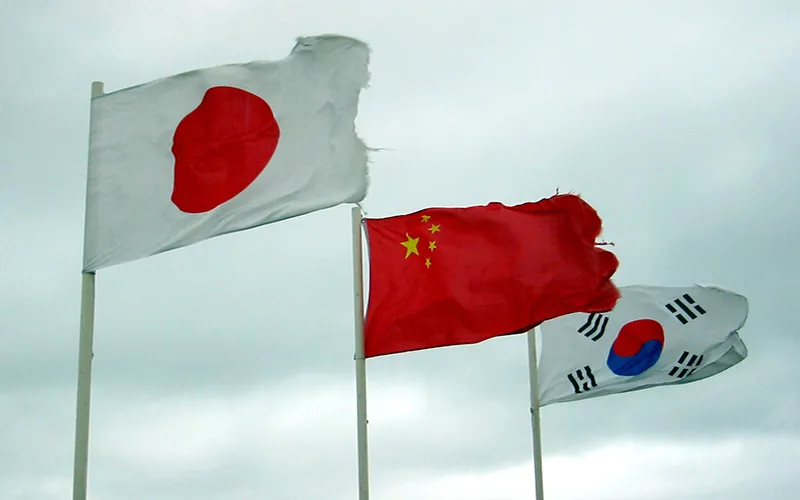An appropriate description of Japan-South Korea relations should be symbiotic. After all, both these leading Asian nations have numerous shared interests and ideologies. They have witnessed great economic growth, become leading liberal democracies, share North Korea as a common threat, are close US allies in the Asia-Pacific, and are weary of a rising China. Yet, these two countries, which seem to have so much to gain from closer ties, find themselves at logger heads over a number of historical issues.
One such issue is the use of "comfort women" - girls and women from South Korea, China, the Philippines, Netherlands etc, forced to work in brothels by the Imperial Army of Japan during the World War-II. Since the 1990s, this issue has been a hot topic of debate amongst politicians, academics, and the international community, and it has on numerous occasions resulted in impeding bilateral relations between these two nations. As the geo-strategic nature of the Asia-Pacific changes, can Japan and South Korea overcome this issue?
Crafting a reconciliatory narrative, especially one dealing with historical issues, is always easier said than done. The comfort women issue is a complex one, compounded further by political and strategic changes on three verticals. On one vertical this issue is brought forth by the domestic politics and narratives found within Japan, and South Korea. On the second vertical, external factors such as China play an important role in exacerbating the situation, and on the third vertical assessing the nature of the nations that have overcome similar ordeals in the past paves the way for reconciliation.
First vertical
At present the common rhetoric in Japan is that they have hit the wall, and are suffering an "apology fatigue," caused by the failure of South Korea to recognise Tokyo's repeated apologies. The 1993 Kono Statement stated that the Japanese Government extended "its sincere apologies and remorse to all those, irrespective of place of origin, who suffered immeasurable pain and incurable physical and psychological wounds as comfort women." Amongst many others, apologies were also given by Prime Minister Murayama Tomiichi in his 1995 Fiftieth Anniversary of the War's end speech, and Prime Minister Koizumi Junichiro's 2005 Sixtieth Anniversary of the War's end speech.
Furthermore, in 1995, Japan started the Asian Women's Fund where they disbursed 700 million yen from the national budget to support AWF's medical and welfare activities to those comfort women identified, and another 600 million yen was raised by a wide range of individuals, enterprises, labour unions, political parties, and Diet members to support the aims of the AWF. Additionally, then Prime Minister Murayama also sent personally signed letters expressing apologies and remorse to those comfort women.
Trust between the two is impeded further by instances such as South Korea's failure to adhere to the 1965 Treaty of Normalization. By signing this treaty, the Park Chung-hee administration agreed never to make further compensation demands against Japan, either at a government or individual level, after receiving US$500 million in grants and soft loans from Tokyo as compensation for its 1910-45 colonial rule. Despite this, the South Korean Government is still demanding further reparations from the Japanese government.
The South Korean rhetoric is that Japan still needs to acknowledge its wrongdoings, and recognise South Korea's past suffering. There is immense frustration with the Japanese right wing attitudes, which Seoul accuses of trying to "rewrite", and "whitewash" history. Since being re-elected in 2012, Prime Minister Abe has sent confusing signals that seem to undermine previous apologies. There have been instances where Abe has denied that the women were coerced, thus implying that they were indeed willing prostitutes. To his cabinet, Abe has also elected ministers who have denied past wartime abuses. Also, visits to the Yasukuni shrine by Prime Minister Koizumi in 2005, and Prime Minister Abe in 2013 infuriate not only Seoul, but many in the international community. These actions fuel the incentive within South Korea to cling to the past.
Furthermore, past incidents such as the Asahi Shimbun controversy in the 90s opened the floodgates for the blame game to continue between South Korea and Japanese right wing nationalists. The Asahi Shimbun, a leading newspaper in Japan retracted its articles that were carried during the 80s and 90s which recognised that comfort women were indeed forced into sexual slavery based on the narratives of a former Japanese soldier named Yoshida Seiji, who claimed he had coerced women on the island of Jeju into service. The newspaper issued an apology, after Seiji's testimony was discredited. Post the Asahi withdrawal, Japan demanded a revision of the 1996 UN report, which described the comfort women system as "military sexual slavery." However, this request was declined, leaving both South Korea and Japan once again at odds over the issue.
Second vertical
Reconciliation becomes unfavourable as South Korea, well aware of its position in North East Asia as the "shrimp amongst the whales," distances itself from Japan in order to appease China, who is weary of the new US balancing in the Asia Pacific. South Korea is also mindful of its growing dependence on China for its economic prosperity (China is their largest trading partner, with trade hitting the $200 billion mark in 2011), and for potential unification with North Korea. Thus, until and unless Seoul begins to view China as a significant threat, South Korean leaders have little incentive to improve relations with Japan.
President Park, in her insistence that Japan first address historical issues over its annexation of Korea more than 100 years ago, works to promote a nationalistic sentiment back home which portrays South Korea being tough on Japan. South Korea like China, has also erected statues, and museums for its comfort women, not only in South Korea, but in many Korean dominated localities in the US such as Glendale, California.
In 2014, at the suggestion of President Park, Chinese President Xi Jinping opened a memorial hall in Harbin, China, to commemorate Ahn Jung-geun, a Korean activist who assassinated four-time Japanese Prime Minister Hirobumi Ito in 1909 at the Harbin railway station in China. Such incidents not only highlight the "history problem," but it also makes political reconciliation next to impossible as it enables an external country - China to successfully drive a wedge between these two nations.
Third vertical
The question that begs to be asked is that why has bitter history with other nations not prevented Japan from establishing friendly and productive partnerships with them? Since the end of WW II, Japan has been successful in reaching out to its ex colonised South East Asian neighbours. The Philippines sets a great example of a nation whose comfort women suffered the same fate as those of South Korea and China, yet they have been able to forgive Japan.
After the end of WW II, Japan has never waged war on another nation. Instead, Japan has been a major donor of humanitarian and economic aid, a large amount of which South Korea has accepted. More credit should be given to Japan, who over the years has become defensive over cries that it is re-emerging as a nationalistic state.
Though over the years political and strategic narratives related to comfort women have dictated the demise in bilateral relations, positive signs of cooperation are emerging. In March, Foreign Ministerial level trilateral talks took place in Seoul between Japan-South Korea- China, with the ministers agreeing to restore a "trilateral summit" amongst their leaders. This was followed by secretary level bilateral talks between Japan and South Korea.
The year 2015 not only marks an important date in international history - the 70th anniversary of the end of World War II, but it is also the 50th anniversary of normalisation of relations between South Korea and Japan. It is a chance that both Japan and South Korea should grab with an aim to re-normalise their relations. Reconciliation has to come from both sides, not one. Prime Minister Abe in his 70th Anniversary of the War's end speech would need to clearly, sincerely, and unambiguously acknowledge Japan's wartime crimes. South Korea for its part would also need to recognize Tokyo's apologies, which would soothe Japan's apology fatigue.
In putting their shared past behind them, South Korea and Japan have an opportunity to set an example for other nations in Asia that have been unable to resolve and overcome past war crimes, and distortions of history.
(Vindu Mai Chotani is a Research Assistant at Observer Research Foundation, Delhi)
The views expressed above belong to the author(s). ORF research and analyses now available on Telegram! Click here to access our curated content — blogs, longforms and interviews.




 PREV
PREV


